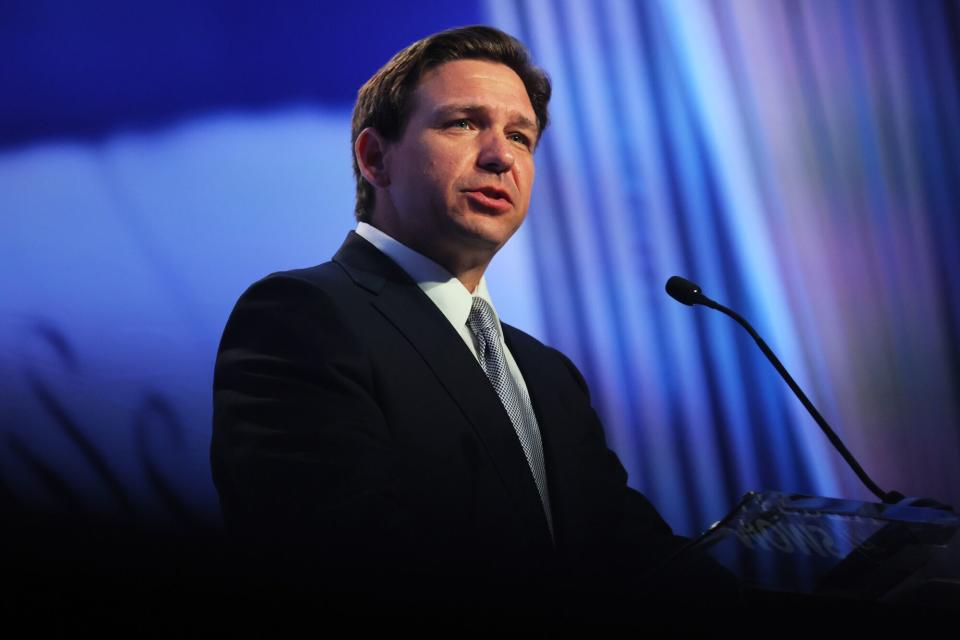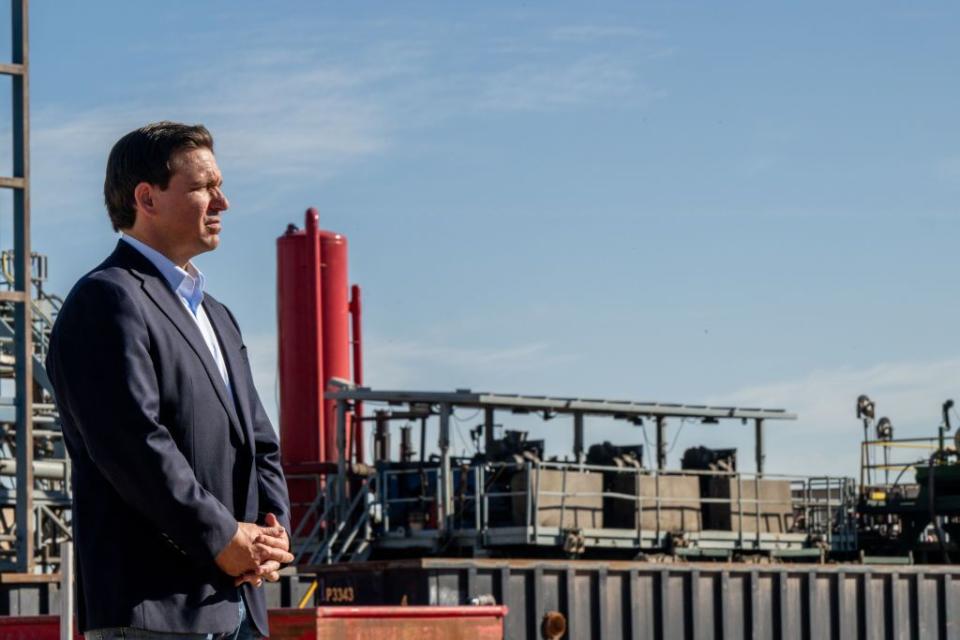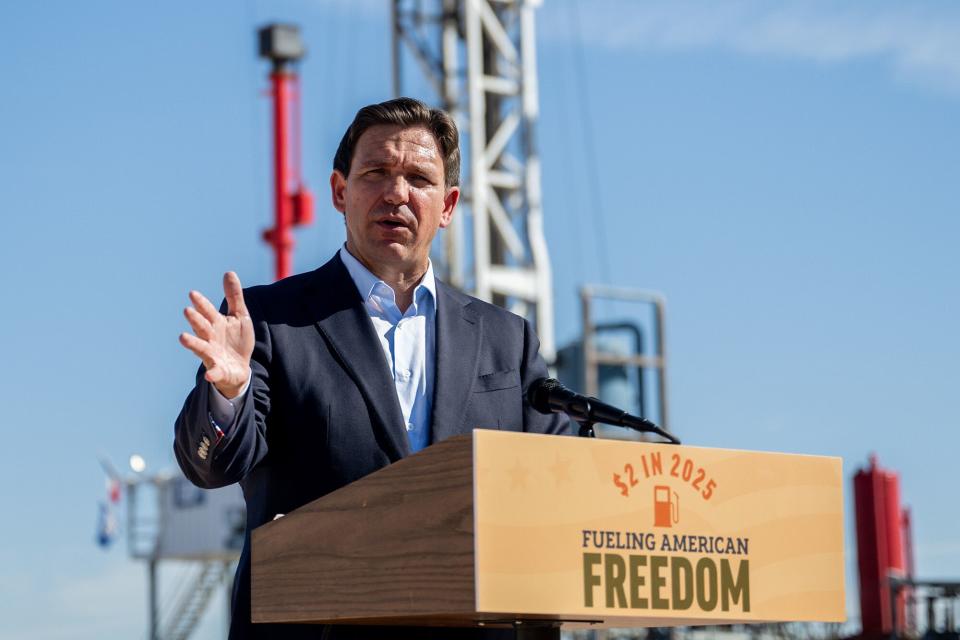Ron DeSantis Pledges $2 Gasoline, More US Fuel Production
- Oops!Something went wrong.Please try again later.
(Bloomberg) -- Florida Governor Ron DeSantis delivered a full-throated call for more US oil and gas production, promising to jettison policies he says are holding back domestic energy output.
Most Read from Bloomberg
Ex-Goldman Bankers Make a Fortune With Controversial Bet on Coal
‘Dead Space’ Co-Creator Departs Startup After Newest Game Flops
Passalacqua in Italy’s Lake Como Is Named Best Hotel in the World
DeSantis vowed to be “laser-focused on reducing gas prices and energy costs,” with a goal of achieving $2 gas in 2025, according to the energy policy plan he released Wednesday.
“As your president, I will restore our freedom to fuel. I will ensure that the United States of America is the dominant energy producer in the entire world,” he said in a speech in Midland, Texas outlining the central tenets of his blueprint. “I will ensure that this country does not have to rely on hostile nations for its energy needs ever again.”
The Republican presidential candidate’s plan would encourage more domestic oil development, expand exports and make fossil fuel production central to national security and foreign policy priorities.
The venue choice for the speech was strategic. The West Texas city is the center of the country’s most productive oil basin that’s the source of about one-third of US crude output. The boomtown, which has been described as an “oasis of wealth,” grew up with the American oil industry.
DeSantis, positioned in front of an oil rig, was surrounded by dozens of energy industry workers, many of whom are West Texas locals. Following the speech, DeSantis donned a hard hat for a photo on the rig.
Read More: Texas’ Oil Capital Makes Name as a Place Few Want to Call Home
The unveiling of his sweeping energy plan comes as DeSantis embarks on a three-day fundraising swing through Texas, with stops to meet with donors planned around the state. By touting his energy proposal, DeSantis hopes to position himself as the most policy-focused GOP presidential candidate while also appealing to Texas donors uniquely concerned with the future of the oil and gas industries.
Republicans have seized on rising gasoline and crude prices as a political vulnerability for President Joe Biden, who has championed renewable energy and curtailed oil leasing. Oil surged to a 10-month high on Tuesday, with futures for global benchmark Brent crude briefly nearing $96 — amid a flurry of predictions that the world could see the return of $100 oil.
DeSantis’s $2 price per gallon pledge may make for good politics, but it would be difficult to achieve. While presidents often get blamed for high gasoline prices, they generally have limited influence over what Americans pay at the pump. The last time a gallon of unleaded gasoline cost $2 on average in the US was in June 2020, when pandemic shutdowns kept people off the roads and caused demand to collapse.
Investors are loathe to overspend on new drilling, and oil executives have spurned many of Biden’s exhortations to produce more crude, citing longer-term economic forecasts and trends beyond Washington that favor sustainability and electric vehicles. The industry is also increasingly reluctant to chart new spending and drilling plans based on policies that can shift on four-year election cycles.
DeSantis is calling for overhauls to a series of policies he says limit consumer choice and hike energy costs. His proposed changes include plans to:
Halt the Environmental Protection Agency’s tailpipe pollution-cutting mandates, likely including proposed standards that would effectively compel automakers to ensure two-thirds of consumer vehicles are electric by 2032
Eliminate subsidies for electric cars, including a newly expanded $7,500 electric vehicle tax credit
Rescind federal regulations that promote ESG — or environmental, social and governance — investing strategies and bar government accounts and pensions from using those metrics
Repeal federal surtaxes on liquid fuels — such as, gasoline, diesel and propane
Withdraw from the Paris Agreement, global methane pledge and other climate commitments
Promote domestic extraction of fossil fuels — including oil, natural gas, coal and uranium — by approving mining and development on federal lands
Expedite the energy project permitting process
Establish a new “critical mineral strategic reserve” and reduce US reliance on China for the raw materials used in semiconductors, batteries and military planes
Refill the nation’s emergency oil stockpile, which Biden has drawn down to combat high energy costs
Many of the changes would require action from Congress. It also can take years for federal agencies to repeal existing regulations, given requirements to fully justify those changes and subject the decisions to public review.
The energy proposal furthers a recent change within the DeSantis’s campaign to focus more on policy, after he spent the summer trying to revive a flailing campaign operation, beset by overspending, leadership changes and layoffs. The plan also comes one week before the second Republican debate, when voters will be watching to see how the governor fares on stage amid a crowded GOP field.
The DeSantis campaign still faces significant challenges. Former President Donald Trump remains the frontrunner for the GOP nomination with a 44.4 point lead over DeSantis, according to the RealClearPolitics polling average. DeSantis is the only other candidate polling in double digits with 12.6%.
The DeSantis operation is hoping to halt Trump’s momentum in early voting states, including Iowa, where DeSantis has been spending considerable time and where his allied super political action committee has 21 paid staffers on the ground.
(Updates with quotes, details from speech)
Most Read from Bloomberg Businessweek
©2023 Bloomberg L.P.






